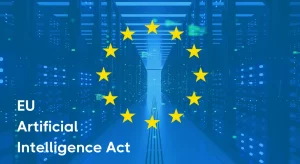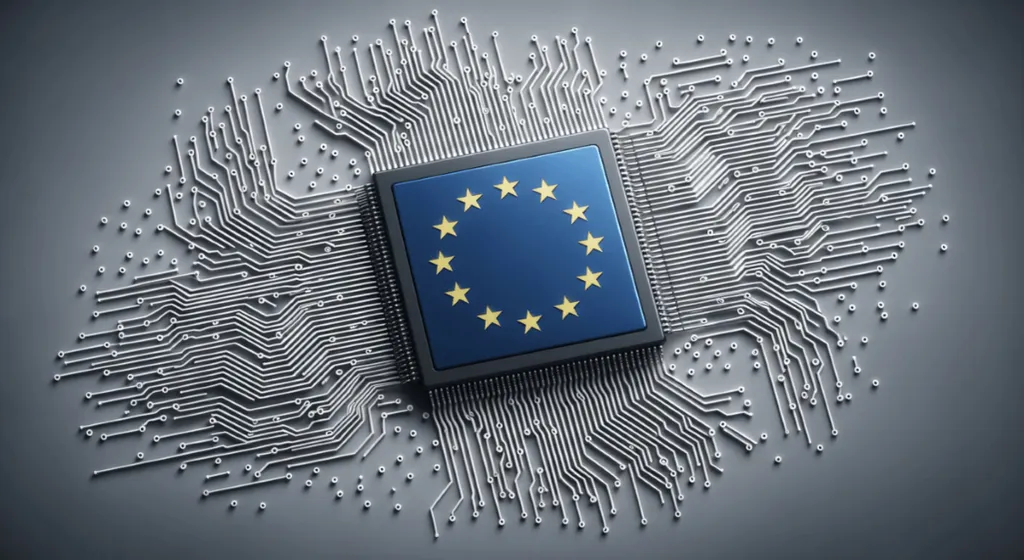Introducing the EU AI Act: Enhancing Transparency and New Challenges for Tech Firms
The European Union has introduced the EU AI Act, a landmark piece of legislation designed to establish a comprehensive governance framework for artificial intelligence across the continent. This regulation mandates that organizations enhance transparency concerning the training data used in their AI systems, potentially upending the current practices of tech firms, particularly those in Silicon Valley, where companies have historically guarded their AI development and deployment processes against extensive scrutiny.
This move by the EU represents one of the most ambitious regulatory attempts globally to control the rapidly evolving field of AI. By pushing for greater transparency, the EU aims to address growing concerns about the ethical implications of AI and its impact on society. The act’s introduction is a clear signal of the EU’s intent to lead the global conversation on AI governance, setting a precedent that could influence other regions.
Surge in Interest and Investment in Generative AI Technologies
The global AI landscape has undergone a seismic shift since the launch of OpenAI’s ChatGPT, which Microsoft has significantly backed. Over the past 18 months, there has been an unprecedented surge in interest and investment in generative AI technologies, with applications capable of generating text, images, and audio content at an extraordinary pace. These advancements have captured the imagination of businesses and consumers alike, driving a wave of innovation and new business models across industries.
However, this explosion in AI activity has also brought to the forefront critical ethical and legal questions: How do AI developers source the vast amounts of data required to train their models? Is this data acquisition process infringing on the intellectual property rights of content creators? The rapid deployment of generative AI has led to a significant debate over the legality and morality of using potentially copyrighted material without explicit permission.
Implementing the EU AI Act
The European Union’s AI Act, set to be gradually implemented over the next two years, aims to address these issues. This phased approach allows regulators to adapt to the new laws and gives businesses time to comply with their new obligations. However, the implementation of some rules remains uncertain.
A particularly contentious part of the EU AI Act requires organizations deploying general-purpose AI models, like ChatGPT, to provide “detailed summaries” of the training content. The newly established AI Office plans to release a template for these summaries in early 2025, following consultations with stakeholders.
Artificial Intelligence companies have strongly resisted disclosing their training data, arguing that such information constitutes trade secrets that could give competitors an unfair advantage if made public. The required level of detail in these transparency reports mandated by the EU AI Act will significantly impact both small AI startups and major tech firms like Google and Meta, which are heavily invested in AI technology.
In the past year, top technology companies such as Google, OpenAI, and Stability AI have faced lawsuits from creators alleging unauthorized use of their content to train AI models. Under increasing scrutiny, some tech companies have begun negotiating content-licensing deals with media outlets and websites. However, many creators and lawmakers believe these measures are insufficient.
European Union Lawmakers’ Divide
In Europe, lawmakers are divided. Dragos Tudorache, who led the drafting of the EU AI Act in the European Parliament, advocates for AI companies to open-source their datasets to ensure transparency and allow creators to verify if their work has been used in AI training.
Conversely, the French government, under President Emmanuel Macron, has opposed rules that might hinder the competitiveness of European AI startups. French Finance Minister Bruno Le Maire emphasizes the need for Europe to lead in AI innovation, rather than merely consume American and Chinese products.
The EU AI Act attempts to balance the protection of trade secrets with the rights of parties with legitimate interests, including copyright holders. However, achieving this balance is a significant challenge.
Different industries have varied perspectives on this matter. Matthieu Riouf, CEO of AI-powered image-editing firm Photoroom, compares the situation to culinary practices, suggesting that top chefs wouldn’t share all their recipe secrets. This represents one of many scenarios where such issues could arise. On the other hand, Thomas Wolf, co-founder of leading AI startup Hugging Face, argues that while there is a demand for transparency, it doesn’t mean the entire industry will adopt a transparency-first approach.
Recent controversies highlight the complexity of these issues. OpenAI, during a public demonstration of the latest ChatGPT version, faced criticism for using a synthetic voice almost identical to actress Scarlett Johansson’s. These incidents underscore the potential for AI technologies to infringe on personal and proprietary rights.
Balancing Innovation and Regulation in the Artificial Intelligence Industry
The development of the EU AI Act has sparked heated debates about its potential impact on AI innovation and competitiveness. The French government, in particular, has argued that innovation, not regulation, should be prioritized, given the risks of regulating nascent technologies.
The European Union’s approach to regulating AI transparency will significantly affect tech companies, digital creators, and the digital landscape. Policymakers face the challenge of fostering innovation in the dynamic AI industry while ensuring ethical practices and protecting intellectual property.
Tech Giants Among Hundreds of Companies Signing EU Artificial Intelligence Pact
Several major tech companies have committed to the EU’s Safe AI Pact. More than a hundred firms, including Microsoft, Google, and Vodafone, have joined this initiative aimed at fostering responsible AI use.
The pact focuses on three main goals: First, companies pledge to implement governance strategies that support the integration of AI within their operations and prepare for future compliance with the AI Act. Second, they commit to identifying AI systems that may be deemed high-risk under the upcoming AI Act. These include critical systems like infrastructure, employment services, and law enforcement. Lastly, the pact promotes AI education and awareness among employees to ensure the ethical development of AI technologies.
Though voluntary, the pact is a prelude to the AI Act, slated for 2026, which will become the world’s most comprehensive AI regulatory framework. Companies failing to comply could face fines of up to 7% of global revenue, particularly for high-risk systems that will need to meet stringent standards like activity monitoring and cybersecurity measures.
This comes amidst growing EU regulations targeting Big Tech, such as the Digital Services Act and the Digital Market Act, which aim to limit the influence of tech giants and enhance privacy protections. The EU has shown it won’t hesitate to enforce its regulations, with firms like Apple already holding back AI features in the region due to unclear regulations.
Conclusion
If adopted, the EU AI Act would mark a significant step toward greater transparency in AI development. However, the practical implementation and outcomes of these regulations remain to be seen. Moving forward, balancing innovation, ethical AI development, and intellectual property protection will be a central issue for all stakeholders.
The implications of the EU AI Act are vast and multifaceted. For instance, small AI startups might struggle with the new requirements due to limited resources. Unlike major corporations, these startups may not have the infrastructure to track and report detailed training data. This could create an uneven playing field, potentially stifling innovation and competition in the AI sector.
Furthermore, the requirement for transparency might expose sensitive information that could be exploited by malicious actors. Cybersecurity experts have raised concerns that detailed summaries of AI training data could be misused for nefarious purposes, such as developing adversarial attacks on AI systems. This adds another layer of complexity to the debate on AI regulation.
From a legal perspective, the EU AI Act introduces new challenges related to intellectual property rights. Content creators are rightfully concerned about the unauthorized use of their work, but the enforcement of these rights in the context of AI training data remains unclear. The Act’s success will depend on the ability of lawmakers to develop robust mechanisms for dispute resolution and enforcement.
On the other hand, the EU AI Act could also drive positive change by encouraging more ethical AI practices. Increased transparency might lead to better accountability and trust in AI systems. Consumers and businesses alike are becoming more aware of the ethical implications of AI, and the Act could serve as a catalyst for more responsible AI development.
In the global context, the EU AI Act’s proactive stance on AI regulation could influence other regions to adopt similar measures. Countries around the world are grappling with the challenges posed by AI, and the EU AI Act could serve as a model for developing comprehensive AI governance frameworks. This could lead to a more harmonized approach to AI regulation globally, promoting international collaboration on AI ethics and standards.
However, it’s important to recognize that the EU AI Act is not a one-size-fits-all solution. The diverse applications of AI across different sectors require tailored regulatory approaches. For example, the healthcare sector has specific needs and challenges related to AI, such as ensuring patient privacy and data security. Similarly, the financial sector must address issues related to algorithmic transparency and bias.
As the EU AI Act moves forward, ongoing dialogue between policymakers, industry stakeholders, and the public will be crucial. This collaborative approach can help identify potential pitfalls and ensure that the legislation effectively addresses the diverse needs of the AI ecosystem.
The EU AI Act represents a significant step towards greater transparency and accountability in AI development. Its implementation will have far-reaching implications for the tech industry, content creators, and consumers. By fostering a balance between innovation and ethical practices, the Act aims to create a more trustworthy and equitable AI landscape. As the world watches the European Union’s regulatory experiment, the lessons learned will undoubtedly shape the future of AI governance on a global scale.







